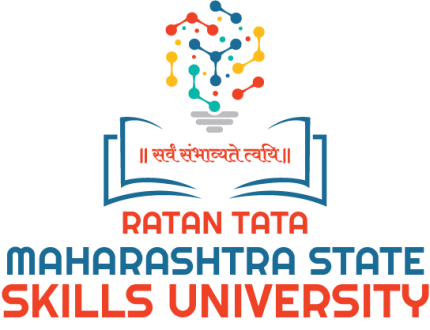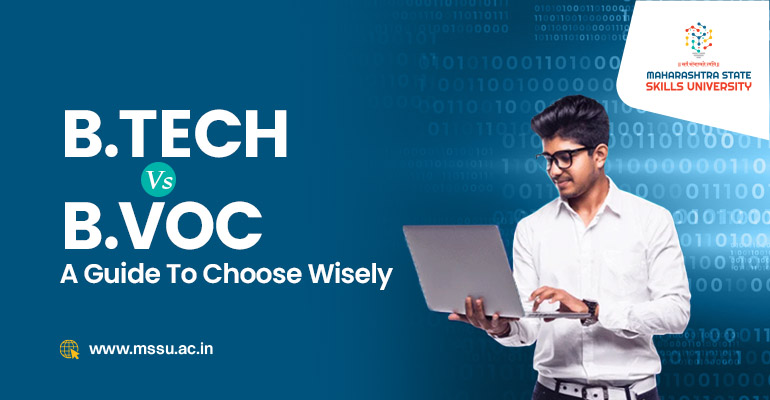B.Tech vs. B.Voc: Distinctive Features and Career Outcomes
July 26, 2024 2024-08-01 15:24B.Tech vs. B.Voc: Distinctive Features and Career Outcomes
Choosing the correct educational path is critical to determining one’s profession and future. Two popular undergraduate options for students are the Bachelor of Technology (B.Tech) and the Bachelor of Vocation (B.Voc). Each program has distinct characteristics, entrance criteria, curriculum, and career prospects. This blog will look at the differences between B.Tech and B.Voc degrees, as well as their advantages and prospective career pathways, with a focus on the Maharashtra State Skills University (MSSU) offers.
Entry Requirements
One of the biggest differences between B.Tech and B.Voc programs is in their entrance criteria.
B.Tech Entry Requirements
The B.Tech program often has more severe entrance requirements. Students must have finished their 10+2 education in a non-medical stream and received a competitive NEET rank. This single access point encourages students to study intensively for admission tests, which can be a considerable barrier for many.
B.Voc Entry Requirements
In comparison, the B.Voc program provides more freedom. Students from any stream can join at the 10+2 level without requiring a competitive exam rank. This multi-entry method makes B.Voc more accessible to a wider variety of students by prioritizing inclusiveness and skill development above academic competitiveness.
Curriculum Structure
The curricular focus of B.Tech and B.Voc programs is another area where they differ significantly.
B.Tech curriculum
The B.Tech program is generally intellectual and theory-based. It teaches students in-depth about various sectors of engineering and technology, preparing them for technical and analytical positions. The curriculum lasts four years and is challenging, with students being required to participate in intensive laboratory work, projects, and theoretical research.
B.Voc Curriculum.
On the other side, the B.Voc program emphasizes application and skill development. It focuses on honing practical skills for certain occupations and industries. The curriculum is connected to employment position descriptions from the National Skills Qualification Framework (NSQF), guaranteeing industry relevance. B.Voc programs generally last three years, with students gaining hands-on training and work-integrated learning opportunities.
Exit Options
Exit choices provide students the ability to change their educational routes based on their circumstances and professional ambitions.
B.Tech Exit Options
B.Tech students have few departure choices. They can leave the program after three years, although this does not usually result in any recognized qualification. The major aim is to finish the four-year curriculum and obtain a B.Tech degree, which is required for many technical and engineering employment.
B. Voc Exit Options
In contrast, the B.Voc program provides several escape points. Students can obtain a diploma after the first year, an advanced diploma after the second year, and a B.Voc degree after the third year. This multi-exit architecture ensures that students receive recognized certifications at various phases of their study, increasing their employability even if they do not finish the whole program.
Career Paths and Outcomes
The job results of B.Tech and B.Voc graduates reflect the programs’ varied regions.
B.Tech Career Paths
B.Tech graduates are often qualified for high-paying jobs in the engineering and technology industries. They can work in disciplines such as software development, mechanical engineering, civil engineering, and electronics. The B.Tech degree also provides opportunities for professional progression, additional education (such as an M.Tech or MBA), and exposure to foreign employment markets. Furthermore, B.Tech graduates are qualified for a variety of government professions that need a graduate degree.
B.Voc Career Paths
B.Voc graduates have practical skills that qualify them for direct work in a variety of industries, including healthcare, culinary technology, graphic design, and beauty and wellness. The industry-integrated curriculum guarantees that B.Voc graduates are employable and capable of meeting market expectations. Furthermore, the B.Voc curriculum promotes entrepreneurship, allowing graduates to launch their businesses based on the skills they have gained. B.Voc degree holders, like B.Tech graduates, can apply for government employment requiring a graduate degree.
Cost of Education
The financial component of earning a degree is an important factor for many students and their families.
B.Tech Cost
A four-year B.Tech degree typically costs between 3 and 4 lakh INR. This cost might be prohibitive for some students, but scholarships and financial help may be available.
B.VOC Cost
B.Voc programs are often more cheap, with three-year programs costing between 40,000 and 50,000 INR. This decreased cost is frequently achieved through government financial subsidies, making B.Voc an economically realistic choice for many students.
Eligibility for Government Jobs
Both B.Tech and B.Voc degrees qualify graduates for government positions that need a graduate degree. However, the nature of the work responsibilities and industries may vary depending on the unique skills and information gained throughout their study.
Advantages of Pursuing B.Tech at MSSU
Maharashtra State Skills University (MSSU) offers a specialized B.Tech degree designed to create highly skilled and employable graduates. As the first of its kind, MSSU focuses on delivering high-quality skill education and fostering job creation. The B.Tech program at MSSU is structured to meet the demands of the engineering and technology industries through cutting-edge laboratories, industrial internships, and hands-on projects that ensure practical learning and industry exposure. MSSU’s commitment to integrating industry partnerships within the curriculum ensures that students gain relevant skills and are job-ready upon graduation, contributing to the economic growth of the state by reducing unemployment and providing a job-ready workforce.
Advantages of Pursuing B.Voc at MSSU
Maharashtra State Skills University’s B.Voc programs stand out for their focus on skill development and employability. MSSU collaborates with industry partners to create a market-driven curriculum that provides students with practical training and relevant skills. These programs are accessible, thanks to government funding, and maintain high academic standards. The unique multi-entry and multi-exit system offers students flexibility, with recognized certifications at various stages, enhancing their career prospects. MSSU’s holistic approach includes startups, incubation, employability training, counseling, apprenticeship, on-the-job training, and placement services. This integrated approach supports economically backward communities by providing skill development, employment, entrepreneurship, and self-employment opportunities, ultimately fostering inclusive growth and propelling the state’s economic development.
Making the Right Choice
Choosing between B.Tech and B.Voc depends on individual career goals, interests, and circumstances. Here are some key considerations to help make an informed decision:
- Career Aspirations: If you aspire to work in engineering and technology sectors, pursue higher studies, or aim for international career opportunities, a B.Tech degree may be more suitable. On the other hand, if you are inclined towards practical skills and immediate employability in diverse fields, B.Voc could be the right choice.
- Educational Background: Students from a non-medical stream with a strong aptitude for science and mathematics may find B. Tech is more aligned with their academic strengths. Conversely, B.Voc is accessible to students from any stream and does not require a competitive exam rank.
- Financial Considerations: B.Voc programs generally have lower tuition fees compared to B.Tech, making them an attractive option for students with financial constraints.
- Flexibility: B.Voc’s multiple exit points provide flexibility and ensure that students gain recognized qualifications even if they do not complete the entire program. This flexibility is beneficial for those who may need to enter the workforce earlier due to personal or financial reasons.
- Learning Style: Consider whether you prefer a traditional academic approach (B.Tech) or an application-based, hands-on learning experience (B.Voc). Your learning style and preferences can significantly impact your success and satisfaction with the chosen program.
Conclusion
Both B.Tech and B.Voc programs offered by Maharashtra State Skills University (MSSU) provide valuable educational opportunities with distinct features and career outcomes. B.Tech is ideal for students seeking in-depth technical knowledge and high-paying careers in engineering and technology. B.Voc, with its skill-oriented and industry-integrated curriculum, offers flexible and affordable education, preparing students for diverse career paths and entrepreneurial ventures. Our unique 40% classroom training and 60% on-the-job training will guide you to the right path for the job you desire!
Ultimately, the choice between B.Tech and B.Voc should be based on your career goals, academic background, financial situation, and personal preferences. By carefully considering these factors and understanding the unique benefits of each program, you can make an informed decision that aligns with your aspirations and sets you on a path to success.
Frequently Asked Questions
What are the main differences between B.Tech and B.Voc in terms of entry requirements?
Answer: B.Tech requires a single entry point after 10+2 in a non-medical stream with a NEET rank. In contrast, B.Voc allows entry from any stream at 10+2 without the need for a competitive exam rank, offering greater flexibility and accessibility.
How do the curricula of B.Tech and B.Voc programs differ?
Answer: The B.Tech curriculum is traditionally academic and theory-oriented, focusing on in-depth knowledge in specific fields of engineering and technology. The B.Voc curriculum is application-based and skill-oriented, emphasizing practical skills and work-integrated learning experiences aligned with industry needs.
What are the exit options available in B.Tech and B.Voc programs?
Answer: B.Tech offers limited exit options, with students typically needing to complete the four-year program to earn the degree. B.Voc provides multiple exit points: a diploma after the first year, an advanced diploma after the second year, and a B.Voc degree after completing the third year.
What career paths can B.Voc graduates explore?
Answer: B.Voc graduates are prepared for immediate employment in fields like healthcare, food technology, graphic design, and beauty and wellness. They can also pursue entrepreneurial ventures and are eligible for government jobs that require a graduate degree.
How do the costs of B.Tech and B.Voc programs compare?
Answer: The general fees for a four-year B.Tech degree range from 3 to 4 lakhs INR, whereas the fees for a three-year B.Voc program are typically around 40,000 to 50,000 INR, often subsidized by government grants, making B.Voc more affordable.
Can B.Voc students continue their education if they exit the program early?
Answer: Yes, B.Voc students can continue their education after exiting the program early. They receive a diploma after the first year and an advanced diploma after the second year, which can enhance their qualifications and allow them to re-enter the workforce or continue their studies.
What should students consider when choosing between B.Tech and B.Voc?
Answer: Students should consider their career goals, educational background, financial situation, and personal preferences. B.Tech is ideal for those seeking technical knowledge and high-paying engineering careers, while B.Voc offers flexibility, affordability, and practical skills for diverse career paths.



